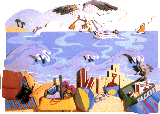
 Water sports, cruise-ship travel, and ocean-based
recreation are a large part of the world's fastest-growing
industry --tourism. §
Water sports, cruise-ship travel, and ocean-based
recreation are a large part of the world's fastest-growing
industry --tourism. §
With so many tourists heading to
beaches, other industries benefit: transportation, lodging,
restaurants, retail stores, and construction and repair trades.
Illustration courtesy of Sally Jo Vitsky
What to take §
sport fishing:
- rods and reels
- bait, tackle, lures
swimming and sunbathing:
- beach umbrella, chair, towel
- swim suit, trunks
- beach ball
- sunscreen, sunburn medications
- sunglasses
- bucket and shovel for sand castles
diving:
- snorkel, mask, swim fins
- wet suit
- scuba gear
water sports:
- surfboards
- sailboards
- water skis
- parasails
- kayaks
- sail boats
- motor boats
- life preservers
- first-aid kit
sailing, cruising:
- sea-sickness medications
- deck shoes
- shuffleboard set
bird watching:
- binoculars
- insect repellent
- field guide
- foul-weather clothing
What not to bring back...
It's illegal and harmful to buy goods that threaten already
endangered species, as well as whole environments such as coral
reefs. Each year the U.S. Customs Service confiscates illegal
items like these, from tourists returning from abroad. §
Virtually indistinguishable fabulous fakes are available for many
items.
From the collections confiscated by U.S. Customs:
 Green-turtle-shell guitar
Green-turtle-shell guitar  Turtle-skin shoes
Turtle-skin shoes
Sea-turtle-shell manicure set and Black-coral necklace (photos not available)
courtesy of the U.S. Fish and Wildlife Service, National Fish and
Wildlife Forensics Laboratory
More Information
 Ocean Planet Exhibition Floorplan
Ocean Planet Exhibition Floorplan

 gene carl feldman (gene@seawifs.gsfc.nasa.gov) (301) 286-9428
gene carl feldman (gene@seawifs.gsfc.nasa.gov) (301) 286-9428
Judith Gradwohl, Smithsonian Institution (Curator/Ocean Planet)
 Green-turtle-shell guitar
Green-turtle-shell guitar  Turtle-skin shoes
Turtle-skin shoes

 Water sports, cruise-ship travel, and ocean-based
recreation are a large part of the world's fastest-growing
industry --tourism. §
Water sports, cruise-ship travel, and ocean-based
recreation are a large part of the world's fastest-growing
industry --tourism. §
 Green-turtle-shell guitar
Green-turtle-shell guitar  Turtle-skin shoes
Turtle-skin shoes
![]() Ocean Planet Exhibition Floorplan
Ocean Planet Exhibition Floorplan
![]()